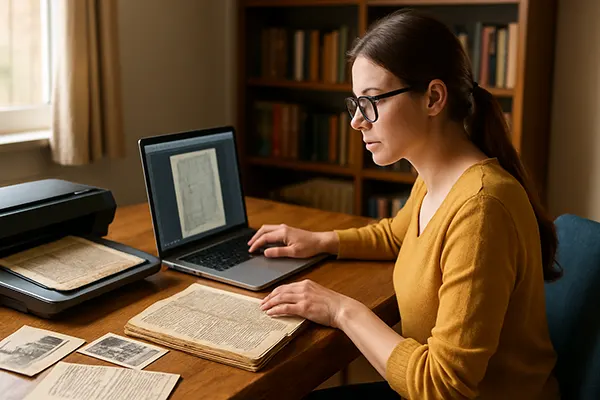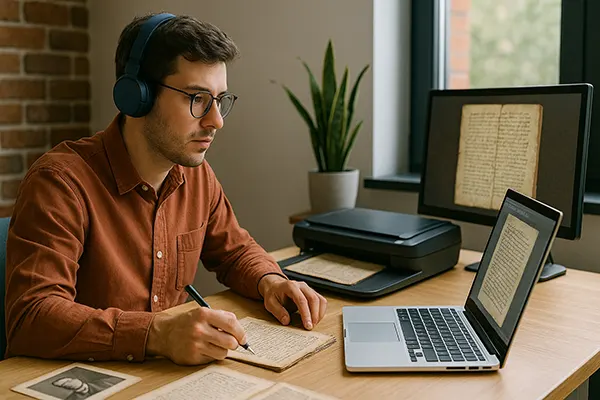Online Work in Digital Archives: Earning by Digitising Historical Data

In an era where history and technology intertwine, digital archiving has become an important part of preserving human heritage. Institutions worldwide are digitising historical manuscripts, newspapers, maps, and photographs—transforming them into searchable, accessible digital formats. This process opens up new avenues for remote work, allowing individuals to contribute meaningfully while earning money from home. Below we explore how this opportunity works, what skills are needed, and what real income looks like in 2025.
Understanding the Role of Digital Archivists in 2025
Digital archivists work remotely with libraries, museums, universities, and private foundations to scan, tag, and catalogue historical content. Their duties might include converting handwritten texts into typed formats, checking OCR (Optical Character Recognition) accuracy, tagging metadata, or structuring archive content logically. As the demand for digital access to historical documents grows, this type of work continues to expand in scope and financial viability.
One of the key trends in 2025 is the decentralisation of these roles. More institutions are outsourcing tasks to freelancers or remote workers via dedicated archival digitisation projects. Opportunities are frequently posted on university websites, freelance job boards, and even through local heritage programmes that receive government or EU funding.
Working in this field doesn’t require a university degree in history, although familiarity with historical contexts, languages (especially Latin, German, or French), and digital tools gives candidates an edge. Most importantly, attention to detail and the ability to follow archiving protocols are essential for success.
Tools and Skills You’ll Need to Start
The core tools used by digital archivists in 2025 include high-resolution scanners, Adobe Acrobat, transcription software, metadata systems like Dublin Core, and cloud-based repositories such as Preservica or Omeka. Entry-level workers may not need all of these, as many employers offer access to internal systems and training materials.
Strong typing skills, good English proficiency, and experience with spreadsheets (Excel or Google Sheets) are often enough to begin. Familiarity with XML and archival schema is a bonus but not essential for all roles. Organisations also look for workers who understand privacy rules and copyright sensitivity when handling scanned materials.
Free courses from the Digital Preservation Coalition or Europeana can help you build foundational skills. Taking these before applying improves both your confidence and your credibility with project coordinators or curators.
How to Find and Apply for Digitisation Jobs Online
Remote positions in digital archiving are available through several channels. Job boards like Indeed, Upwork, and Freelancer.com occasionally post such openings, though more reliable sources include the employment pages of national archives, European heritage initiatives, or university digitisation projects such as the British Library Labs or Europeana’s Transcribathon.
Some of the most consistent demand comes from crowdsourced transcription projects. Zooniverse, for instance, regularly publishes calls for volunteers and paid workers to digitise letters, historical journals, and logbooks. While many of these are unpaid volunteer efforts, some projects—especially those funded by academic grants—offer fixed fees or hourly rates for completion.
Applicants typically need to submit a short form or email describing their interest and availability. Portfolios showing previous digitisation work or transcription examples are highly valued. If you don’t have experience, providing a completed test file with clean formatting and consistent metadata may still secure a position.
Realistic Earnings and Workload Expectations
As of June 2025, average rates for entry-level digital archive work range from £10 to £18 per hour, depending on the complexity and language requirements. For specialised archival roles or projects involving rare materials or multilingual content, this may increase to £25 per hour or higher. Payment is typically processed via PayPal, Wise, or direct deposit after milestones are completed.
Most workers start part-time, committing to 10–20 hours per week. Full-time opportunities are rare unless contracted through an institution. Project-based roles may offer more flexible hours but come with deadlines. Freelancers can expect to earn between £400 and £1000 monthly, with top earners surpassing this through multiple projects.
Consistency is key. Long-term collaborators who deliver high-quality work often receive priority for new assignments or referrals to other institutions. Keeping communication clear and professional ensures stronger relationships with project coordinators.

Challenges and Ethical Considerations in Archival Work
Working with historical data requires ethical sensitivity. In 2025, more institutions emphasise privacy, especially when digitising 20th-century documents that may contain personal or political content. Workers are expected to handle such material discreetly, often under strict confidentiality agreements.
Language barriers can also present a challenge. Many archives include materials in old or dialectical variants, requiring basic translation or linguistic deduction. While machine translation tools like DeepL or Google Translate assist with this, they are not foolproof, and human judgement remains essential.
Another consideration is emotional labour. Historical materials—war letters, medical records, or police files—may contain distressing content. Workers need to be prepared for this and establish personal boundaries to avoid burnout. Support forums and ethical guidelines offered by academic institutions can help in this respect.
Building a Reputation and Future Prospects
Success in this field grows through portfolio development and word-of-mouth. Many freelance digital archivists build personal websites or use GitHub repositories to showcase their finished projects and highlight their methodologies. Demonstrating your workflow is often as valuable as the final result.
Networking through professional associations like the Archives and Records Association (UK & Ireland) or attending virtual symposia can lead to new collaborations. In 2025, more digitisation projects are recruiting directly from these networks rather than relying on mass applications.
Finally, archiving experience serves as a valuable stepping-stone to other fields, including digital humanities, museum work, and historical publishing. Many freelancers use their initial experience to transition into more stable or full-time cultural heritage roles within public institutions or NGOs.
